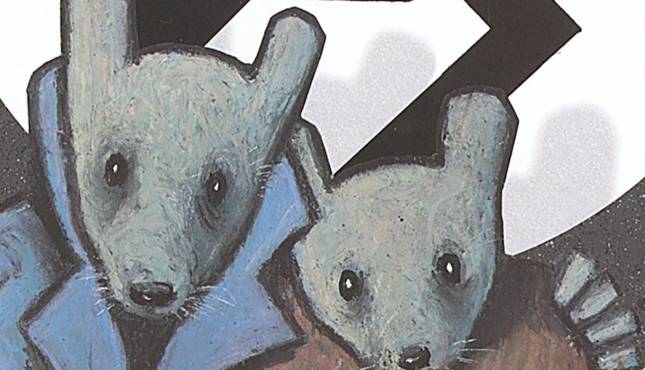Movies & TV / Columns
Off The Rack Comic Review: Maus
 Maus
Maus
Recently on the podcast, we covered Watchmen.
Honestly, it’s one of my favorite episodes we have ever done. It’s really high quality stuff, and I think we all put in good work discussing an important, brilliant book.
But as the show was wrapping up, I brought up something I remembered from my youth. By the time I was an early teen, I started hearing about The Big Three: the comics that, at least at that time, were the ones considered above the rest of the genre. The must-reads. They were Watchmen, Dark Knight Returns, and Maus. From that discussion comes this review of Maus.

TITLE: Maus
Writer and Artist: Art Spiegelman
Publisher: Pantheon Books
Protagonists: Art Spiegelman, Vladek Spiegelman
Antagonists: Nazis
Maus is the story of Art Spiegelman interviewing his father Vladek over the years and getting the latter to open up about his life during World War II as he tried to evade capture by the Nazis. Eventually, Vladek and his wife Anja are both captured and imprisoned in concentration camps.
For narrative purposes that I will get into, all of the humans in the book are represented by a kind of animal. The Jews—including Art and Vladek—are all mice. The Nazis are cats. The French are frogs, and so on.
In the decades after the war, Anja commits suicide in her bathtub, Vladek remarries to Mala, and Art and Vladek have a contentious, almost adversarial relationship. But Art reaches out to his father for his story, and it all unfolds.

The first thing I remember thinking as I poured over Maus was that the animal allegory did not mean what I thought it would. The idea isn’t that the Nazi cats eat the Jew mice, and the characters don’t act as the animals they portray. Everyone in the story is absolutely human and living a human life… they just are drawn as critters. Why?
Well, I think there are two reasons for that.
The first being that this story is dark and cruel and unrelenting. The animal portrayal is there in a way to make it somewhat more palatable. The cartoon aspect of the book stops the story from ever getting TOO hard to read. Don’t get me wrong; it absolutely walks right next to that line. But seeing the horrors inflicted on avatars stops everything short of feeling gratuitous. It reads as sort of a coping mechanism. The horrors of World War II and the Holocaust are so unfathomable, that you almost have to picture it as unrealistic because the mind can’t otherwise absorb it.
For the second part, I’ll throw apologies out to my cohost Chad who frequently calls back to Scott McCloud’s Understanding Comics wherein McCloud discusses that the more detail art is given the less relatable it becomes (using a scale of Ladies’ Room Figure to Mona Lisa). It’s easy for people to relate to basic cartoons and difficult for them to associate themselves with layered works. So in Maus, where the characters are these crude animals, any reader can subconsciously imagine themselves in a role. It’s almost diametrically opposed to the first point: you can imagine the terror happening to you because it’s a cartoon, but because it’s a cartoon it is less terrible. But it still works on both layers because it’s making the scenario less outwardly vulgar but more inwardly frightening. It lets you get right up close to the nightmare while maintaining a protective glass between you and it.
So, yeah. Sorry, Chad! I know this is your shtick, but I finally found an example where it fit for me!
Another point that sticks with me is that Art and Vladek make no bones about the fact that his family was lucky. Not just lucky in that some incredibly fortuitous circumstances helped them stay alive, but also lucky that prior to the War, they were wealthy. And they were able to parlay that wealth into favors and bribes that helped them survive even while the less fortunate around them weren’t able to.
So you can simultaneously be happy that this family survived while almost… resenting them? Because they started out with a hand up that literally millions of others did not. It’s awful to think about because you almost want an Everyman (Everymouse?) story here, but… six million Jews died in the Holocaust. It took a lot of chance and circumstance to make it out alive.
Maus is so difficult in its brilliance. Vladek is both a character you can disapprove of in the present day and still have an ocean of empathy for in the past. Art is very honest in showing that he wants his father’s story but doesn’t necessarily treat his father well. As a reader, you can easily be left with conflicing feelings on any given character. Everyone here is ironically an incredibly deep and nuanced character, and if Art whitewashed much of his family dynamic to present a more flowery picture, I can’t imagine where it might be.
Talking Point: In the years since I was a kid, a LOT of fantastic comic books have come out that have broken the boundaries of being “just comics”. But for me, I will always think of Maus, Watchmen, and Dark Knight Returns as the most widely respected three. So of those three… what are your thoughts? Which is best? Which is most important? Which is the most well-done?
And while you’re thinking on that, if you want to enjoy more comic book related blogs and a weekly podcast, visit Ghosts of the Stratosphere. Our podcast is full of debates, top ten lists, and comic reviews, and we update daily!
You can also follow us on Twitter, @gotstratosphere for updates!








